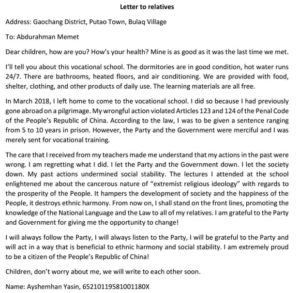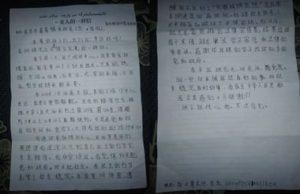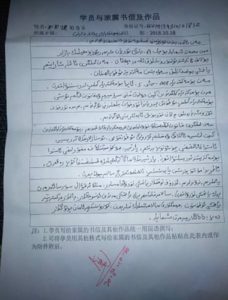
Abdurahman Memet, a Uighur man believed to have been detained for leaking letters from inside Xinjiang’s ‘re-education’ camps. Photograph: Supplied
A Uighur man who leaked letters from inmates at China’s secretive internment camps in Xinjiang has been detained, according to activists and relatives.
Abdurahman Memet, 30, a tour guide in Turpan, last year received letters from his parents and brother, written from inside detention centres in the far western region where as many as 1.5 million Muslims are believed to be detained in political “re-education” and other camps.
In July, the letters were translated and published in the Xinjiang Victims Database, a public repository and watchdog site. The rare documents, among the first from inside a camp, spread quickly online. In less than a week, Memet vanished.
Muherrem Muhammad’ali, Memet’s nephew who lives overseas, said his uncle had sent him the letters as “proof” of the detention of many in their family. He decided to publish them last month in the database.
“He believed the letters were proof. In our family, we had 10 people who were detained, so this was evidence,” said Muhammad’ali, who held on to the letters for almost a year before giving them to activists to post online.
“I want to publicise the experiences of my family, to awaken people’s conscience to say no to this regime and rescue Uighur people, and save this culture,” he said. “It’s not just me who has suffered this fate, but millions have seen their households ruined and families wrenched apart. They have been forced to leave their homes.”
Within two days of the documents going online, Memet told Muhammad’ali he had received a call from police demanding to know with whom he had shared the letters. By the end of the month, Muhammad’ali learned through contacts that his uncle had been detained in Turpan. Police in Turpan did not respond to requests from the Guardian for comment.
The letters, addressed to Memet as well as his sister-in-law, appear aimed at comforting family members as well as supporting the government’s version of the camps, which Beijing says are “vocational training centres”. All three praised the generosity of the party and pledged their loyalty.
But the letters still contain disturbing details and echo the self-criticisms and confessions that were a feature of similar “re-education” camps in the Cultural Revolution.
Memet’s mother, 60, wrote that the dormitories were in “good condition”, equipped with hot water, bathrooms, and air conditioning, and that inmates were provided food, shelter, clothing and “free” learning materials.
Advertisement
She goes on: “I let the party and the government down. I let the society down… I am grateful to the party and government for giving me the opportunity to change! I will always follow the party, I will always listen to the party, I will be grateful to the party”.
The letters indicate Memet’s relatives were detained for actions such as going on hajj or praying that are not illegal under Chinese law. China’s constitution guarantees citizens “freedom of religious belief” and officials frequently rebut criticism of Beijing’s policies in Xinjiang by saying all residents “freely engage in religious activities according to the law.”
In a longer letter, Memet’s brother wrote to his wife that he had cried “tears of happiness” upon hearing he would not be sentenced to prison for “the crime of learning to pray from my father” at the age of 15, in 1987.
Instead, he would receive training from “knowledgeable teachers” and “brave police” who stay with the detainees “night and day” and “continuously [give] classes in the national language and law”. The Uighur-speaking former detainees have described being forced to learn Mandarin and pledge allegiance to the Chinese communist party.
Advertisement
Memet’s 75-year-old father wrote: “Because of my low awareness of the law, I had gone on a pilgrimage to Mecca. After coming to this school, lectures, movies, and the instruction offered by the teachers have allowed me to understand my mistakes.” He added: “I am grateful for the forgiveness the party has shown me.”
Activists say Memet’s detention underlines the government’s efforts to control information flowing out of Xinjiang, even as officials say visitors are welcome and that all government policies are in line with Chinese and international law.
“Memet’s arrest for sharing what are essentially ‘patriotic letters’ suggests party propaganda is so frail that even it must be filtered and delivered only through sanctioned mouthpieces,” said Gene Bunin, who founded the Xinjiang Victims Database, which now has more than 5,000 accounts of detainees and others subject to government controls.
“It’s important to put the foot down and show the authorities that they can’t scare people into silence,” said Bunin.
Beijing has counteracted growing international outcry with a steady stream of state-media reports detailing the benefits of the training centres, media tours of the camps, and criticisms of western coverage of Xinjiang as “hyping up” the topic.
The letters go against the government’s narrative in other ways. Memet’s mother was detained in January of 2018 but writes in her letter that she has been in the “vocational school” since March of that year, indicating she was under another form of detention for months.
In July, officials in Xinjiang said most of those who had been sent to the camps had been “returned to society” and found jobs.
According to Muhammad’ali, of the 10 family members, seven have been released but continue to be closely watched and controlled by authorities. Memets’ parents and brother were released early this year, but they are restricted from leaving their home or their village for extended periods of time.
Since Memet’s disappearance, Muhammad’ali does not know if his family members have been detained again or how they are doing. “I cannot contact them,” he says.







 Print
Print Email
Email